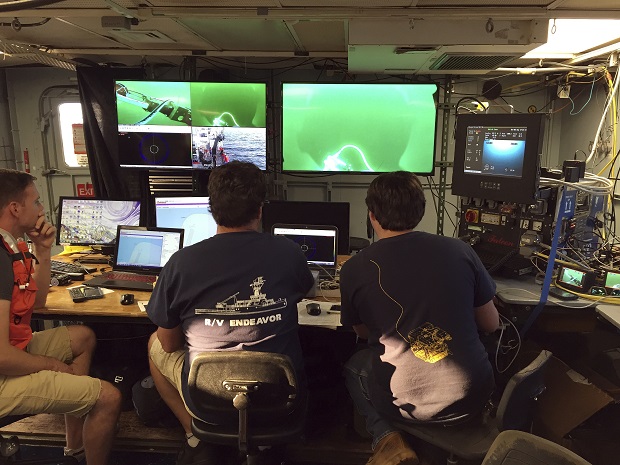Scientists exploring wreck of sunken U-boat off Rhode Island

In this photo provided by the University of Rhode Island, scientists work in the control room of the research ship Endeavor Friday, Sept. 4, 2015, as they explore a German U-boat that sank at the end of World War II several miles off the Rhode Island coast. Scientists from the University’s Inner Space Center, Connecticut’s Ocean Exploration Trust and the US Coast Guard Academy are attempting the exploration during a five-day trip that lasts through Sunday. AP
PROVIDENCE, Rhode Island — Scientists are using submersibles to explore a German U-boat sunk 7 miles (11 kilometers) off the Rhode Island coast the day before Nazi Germany surrendered in World War II, and they’re streaming the attempts online as they work to learn more about shipwrecks and how they affect the environment.
The submarine, U-853, was sunk in the Battle of Point Judith by Coast Guard and Navy ships on May 6, 1945, the day after it took down the SS Black Point, the last US merchant ship sunk in the Atlantic during the war.
The scientists from the University of Rhode Island’s Inner Space Center, Connecticut’s Ocean Exploration Trust and the US Coast Guard Academy hope to explore both wrecks during the five-day trip that lasts through Sunday. By Friday, they had made several attempts that were hampered by the conditions and technical challenges, but they planned to keep trying over the weekend.
They are using the National Science Foundation’s research vessel Endeavor as a base and working 24 hours a day to get access. In addition to streaming online, the scientists are broadcasting three times a day on the local PBS station.
“It’s really a big experiment,” Dwight Coleman, director of the Inner Space Center, said from the boat Thursday. “We’re trying out a lot of things. There’s some technical challenges, which is expected when you’re doing ocean research.”
The scientists first tried to get to Black Point, which is closer to shore and in shallower water than U-853, which sits 130 feet below the surface.
“It was very challenging. We thought it was going to be an easier dive,” Coleman said. “It wasn’t.”
He said they were constantly fighting winds and currents to stay in the same place because the ship doesn’t have dynamic positioning.
At U-853, they had technical problems with the submersible, then a change in the wind speed and direction made exploring the site unworkable Friday.
Instead, they decided on Friday to try diving a different wreck: the schooner barge Montana, which was carrying coal when it sank just off Block Island in 1907.
Coleman said while most ocean research cruises last several weeks, this one is only five days as part of a state-funded effort to provide local researchers and teachers access to Endeavor.
Scuba divers have been visiting the U-Boat and Black Point for decades. The U-boat is considered a war grave and is the property of Germany.
The team notified the German embassy of the expedition and assured it it wouldn’t actually touch the boat, according to Michael Brennan, an archaeological oceanographer at the Ocean Exploration Trust.
There are also hazards nearby, an unexploded depth charge among them.
Coleman said they were inspired by undersea explorer Bob Ballard, a URI scientist who founded the Ocean Exploration Trust and who recently investigated a U-166 off the coast of Mexico with National Geographic and the PBS program NOVA.